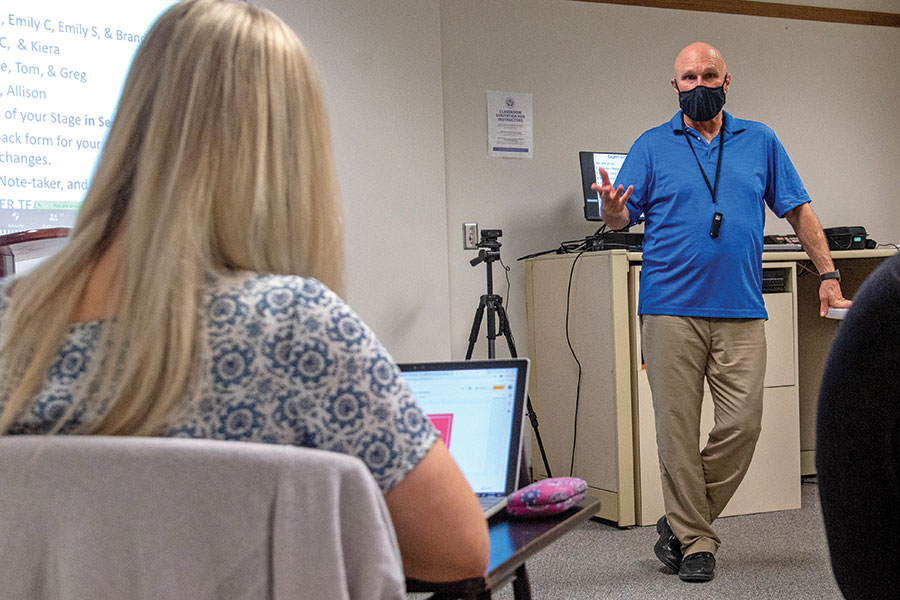LIFE OF THE MIND
Honing Our Craft
Collaboration yields the best outcomes when it comes to improving teaching strategies.
by Maria Hopkins, Ph.D., and Rachel Bailey Jones, Ph.D.

Sharing innovative teaching approaches became essential when the pandemic started and college instructors like Jim Black, associate professor of education, pivoted from in-person to virtual teaching environments nearly overnight.
Readers of Connections know well that teaching is central to the identity of Nazareth. And while teaching and learning is the cornerstone of our community, less visible is the energy that faculty devote to consistently improving ourselves as teachers. Our book, Innovations in Conversations About Teaching: Beyond the Workshop (2021), offers a peek behind the curtain at the ways higher education faculty engage in professional learning to hone our craft, thereby ensuring that students get a great classroom experience. At the heart of our growth is our commitment to supporting one another as professionals.
In the spirit of its theme, the book is a collaboration of Naz faculty and regional colleagues from the Finger Lakes Faculty Development Network. Each institution represented in its chapters is doing something that works — something that creates a self-sustaining, energizing, collaborative faculty learning experience that generates a “spread of effect” within and across our institutions. In other words, we improve our teaching by learning from and with each other. When we do so, our innovations in teaching become contagious in a way that would simply not be possible if we learned about teaching only through presentations about technologies and techniques to try.
As we finished writing the book, the world was on lockdown because of the pandemic. Most faculty had between two and seven days to move all instruction for the semester into a virtual environment. Individuals’ level of comfort with digital learning determined how prepared they were for this transition. In this tight timeline, administrators, faculty developers, and faculty colleagues went to work producing resources, workshops, virtual office hours, websites, and videos to meet the spectrum of faculty need. At Nazareth, the Teaching Innovation and Integration Lab helped to quickly develop resources and mobilize faculty as “digital first responders” to provide on-demand support. Higher education is notoriously slow to change; yet the quick movement to virtual instruction produced nearly instantaneous mass change.
The sudden new reality of socially distant learning meant that innovation was no longer optional. Although many felt unprepared to make this transition, they rallied not only to participate in but to offer opportunities to support colleagues by many means, including ongoing group discussions, peer observations, Zoom help hours, and resource sharing on social media. While the physical space we inhabited shrank to the size of our individual homes, the virtual spaces expanded, with faculty becoming experts in digital learning tools that many of us had never heard of, never mind used.
One of the many remarkable lessons from the pandemic is that crisis drives innovation; change can happen quickly, on a broad scale, and be long-lasting. Last spring, our annual series of faculty development workshops, Workshopalooza, was hosted entirely on Zoom, and many of the concurrent sessions focused on the shift to virtual instruction. The event drew 136 attendees, a number significantly greater than those in the 90s seen in previous years. Faculty in search of new ideas and tips for what works were thirsting for conversations with colleagues whom they trust.
In the midst of this socially distant learning environment, it remains difficult for us to see the long-term impacts. One thing is certain: Our physical, virtual, collaborative, and time spaces will be changed. Faculty supporting each other to improve teaching and serve our students is increasingly important. We hope that our book will help to keep the conversations going.
Maria Hopkins is the director of the Marie Callahan Reading Clinic, director of the graduate literacy program, and an associate professor in the School of Education. Rachel Bailey Jones is co-director of the honors program and a professor in the School of Education.